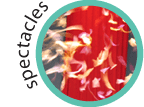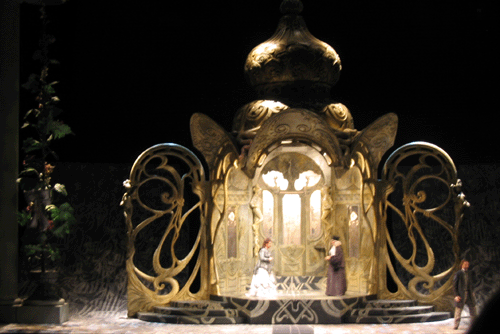














La Chauve-Souris / Die FledermausBy Johann Strauss. At the Opera-Bastille. Produced and adapted by Coline Serreau.
The Opera-Bastille is located at the Place de La Bastille, and we got there after an excruciatingly slow bus ride through the busy streets of Paris. The theatre was well worth the trip though, with its contemporary construction and grand scale. It is one of the two National Theatres, the other being the Théâtre Garnier. La Chauve-Souris is not, as some of us had suspected, 'The Bald Mouse' - but 'The Bat.' A small consolation, but a lot of us were still wondering why we were watching a German opera in Paris. I had never watched an opera before, so I didn't even know there were going to be translations. And finally, Mme. Furstenberg had warned us to be in our sartorial best. I had resigned myself to a completely incomprehensible evening of inaccessibly high culture. I was in for a pleasant surprise, as the piece began - with a sublime musical introduction featuring humanoid bats performing acrobatic feats on ropes. They ran, they jumped, they took off, swerved gracefully, looped and landed in perfect synchrony, outdoing their natural counterparts in everything but the echolocation department. The story is a complicated mélange of love, distrust, adultery, and revenge - with a dash of contemporary French politics added by Coline Serreau - all set in the palatial grandeur of late 19th-century bourgeois life. Gabriel von Eisenstein, a Viennese gentleman, must go to jail for a fortnight because of a civil offense. His wife, Rosalinde, is pursued by her former lover, Alfred, and agrees to receive him while her husband is gone. Unknown to them, Falke, one of Gabriel's friends, invites him to spend the night before the beginning of his sentence at a masquerade, so that pleasant memories of charming ladies help him pass his days in jail. After a tearful farewell, Alfred joins Rosalinde and charms her with his tenor voice, but they are interrupted by the jailor Frank, who mistakes Alfred for Gabriel, and carts him off to jail. The next morning, Gabriel goes to the jail, full of memories of his dalliances with a Hungarian duchess he met at the party. But he is baffled to find his place taken! As he slowly learns the full story, he is enraged at his wife's adultery, and accuses her. - Only to find out that the 'duchess' was his own wife in disguise, and that she now has the proof of his own infidelity. It turns out that the entire episode was a plan by Falke, the chauve-souris, who was out to avenge a much earlier feud alluded to in the overture. All the characters (from the Russian prince hosting the reception, down to the Eisensteins' chambermaid) were accomplices in a plot to expose Gabriel! The play ends with Gabriel dressed as a turkey to symbolize his defeat at the hands of the once-humiliated bat. For me, the best aspect of this opera were the near-magical sets. The grace of the leaping bats was equaled by the grandeur of the palace which literally tore apart to reveal the jail. My chief regret was that I missed the adapted humor - with the thickly accented German-French (Frallemand?), and sly political allusions, this would have been a tall task indeed! |






